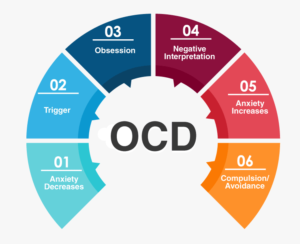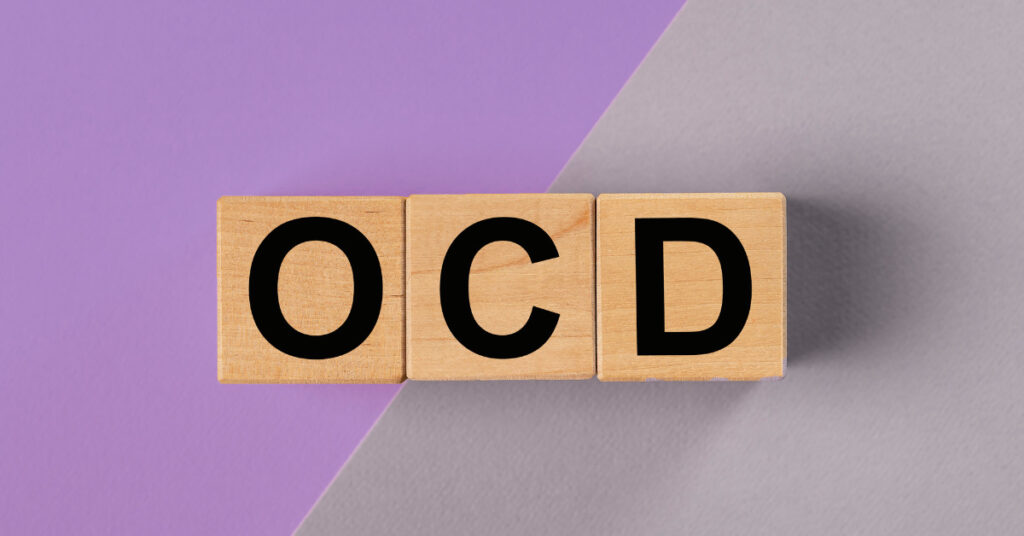OCD is an anxiety disorder characterized by obsessions, compulsions, or both. There are several self-treatment options for OCD and this article covers some of the most prominent ones. The article goes on to discuss in detail the different medications and therapies available to those struggling with OCD.
Contents
What Is Obsessive-Compulsive Disorder?
 Obsessive-compulsive disorder, or OCD, is a mental disorder that causes sufferers to have intrusive, unwanted thoughts (obsessions) and to perform repetitive behaviors (compulsions) to alleviate anxiety. Symptoms of OCD can interfere with daily life and cause significant distress. However, there are effective treatment options available.
Obsessive-compulsive disorder, or OCD, is a mental disorder that causes sufferers to have intrusive, unwanted thoughts (obsessions) and to perform repetitive behaviors (compulsions) to alleviate anxiety. Symptoms of OCD can interfere with daily life and cause significant distress. However, there are effective treatment options available.
Symptoms of Obsessive Compulsive Disorder (OCD) in Children and Adolescents
OCD is a mental disorder that is characterized by intrusive thoughts, repetitive behaviors or rituals, and uncertainty about whether or not the behavior is necessary. The most common symptoms of OCD in children and adolescents include obsessions (germs, bad thoughts, and orderliness), compulsions (rituals to reduce anxiety or to counteract obsessions), and negative patterns of thinking. In some cases, children with OCD may also exhibit features of Tourette Syndrome or Autism Spectrum Disorder.
Children and adolescents who are experiencing symptoms of OCD may not have any of the physical signs or symptoms described above. They may, however, have anxiety and obsessions. If you are concerned that your child is experiencing these symptoms, it is important to keep an eye out for them by taking a careful look at his or her behavior over time. Several studies have identified several distinct types of OCD in children between the ages of 5-18. There is no evidence that the type of OCD someone experiences is related to how severe their symptoms are.
How Common Is OCD?
 OCD is one of the most common anxiety disorders. It affects approximately 2-3% of the population. There is no definitive answer to this question as OCD can vary from person to person. However, one study found that OCD is about twice as common in women than in men.
OCD is one of the most common anxiety disorders. It affects approximately 2-3% of the population. There is no definitive answer to this question as OCD can vary from person to person. However, one study found that OCD is about twice as common in women than in men.
There are many different treatment options available, and effective treatment depends on the individual’s symptoms and overall health condition. In most cases, there is no known cure for OCD. However, with effective treatment and lifestyle changes, getting better can happen. The statistics for OCD are difficult to estimate because people might suffer in silence for years before seeking treatment. OCD is one of the most common mental disorders, affecting about 1 in 200 people.
Self-treatment For OCD
Several self-treatments can be effective for treating OCD. Here are some of the best options:
Mindfulness
If you’re like many people, your day is constantly filled with a million and one things to do. But how can you make time for yourself if OCD keeps intruding? One way to start is by making mindfulness part of your daily routine. Mindfulness is the practice of being fully present at the moment, without judgment. It can be a great way to calm your mind and stop obsessive thoughts from taking over. Here are ways you can make mindfulness part of your day:
- Start with five minutes: If you find it hard to focus for longer than five minutes at a time, start with five minutes. It may seem like a small amount of time, but it will help you get started.
- Do something simple: A lot of people find that the harder their task is, the harder it is to focus on it. Instead, try doing something simple first – like counting your breaths or repeating a mantra to yourself.
- Set a timer: Once you’ve gotten started, set a timer and continue working for as long as you can. This will help you stay on track and prevent you from getting bogged down by the task at hand.
- Break it up: If you tend to get so overwhelmed that you can’t finish anything, break your project into smaller pieces. You may also want to time yourself and see how long it takes you to complete a task.
- Prioritize: Whether you decide to work on them one at a time or in multiple sessions, do not let yourself get bogged down by all of your responsibilities. Your life will only be as
Relaxation Techniques
Stress and anxiety can worsen OCD symptoms, so learning how to relax can be helpful. There are many different relaxation techniques, including deep breathing, progressive muscle relaxation, and meditation. There are a few different methods that can be used to help alleviate OCD symptoms. One of the most common is relaxation techniques.
By focusing on relaxing your body and mind, you can help reduce the amount of stress that is associated with OCD. It’s important to note that, for some people, relaxation techniques can trigger symptoms of OCD. So you may need to work with a therapist who can help you find the best methods to use that are most effective in reducing your symptoms.
Healthy Lifestyle
Taking care of yourself physically and emotionally can help reduce stress and improve your overall well-being. This includes:
Make Time For Yourself
It’s important to remember that you’re not alone in this and there are ways to cope and manage your condition. Take some time for yourself each day to relax and rejuvenate. This could mean taking a bath, reading a book, listening to music, or doing something that you enjoy. Do something that makes you feel good, and don’t feel guilty about it.
Talk To Someone
Often the best way to cope with OCD is to talk about it with someone else. If you don’t feel comfortable talking about it on your own, seek out support groups or talk therapy. Talking about your experiences can help to relieve some of the stress and anxiety associated with OCD.
Exercise Regularly
exercising is beneficial for overall mental health, including OCD symptoms. Exercise releases endorphins which can decrease anxiety and stress levels. It also helps to improve moods and reduce anxiety.
Avoid Caffeine and alcohol
Caffeine is a stimulant and can act as a trigger for people with OCD. Studies have shown that people with OCD are more likely to drink coffee or caffeine in moderation, but excessive amounts of caffeine can be harmful and lead to problems such as anxiety and insomnia. Excessive amounts of alcohol can lead to dehydration, which has been linked to problems with OCD.
Eat A Balanced Diet
A balanced diet is important for both mental and physical health. Eating a balanced diet includes plenty of fruits, vegetables, and whole grains as well as lean protein sources. This type of diet has been shown to help people with OCD reduce their symptoms.
Follow Your Treatment Plan
 Even though it can be challenging at first, sticking to your prescribed medication regimen is one of the most important things you can do to manage your OCD symptoms. If you start to experience any negative side effects from your medication, be sure to speak with your doctor about switching to a different formulation or dosage option. When OCD starts to manifest in unhealthy ways, it’s important to remember that there is help available. It may be difficult to continue with treatment when your OCD is causing you a lot of distress, but it’s essential to stay adherent to your treatment plan if you want to see lasting results.
Even though it can be challenging at first, sticking to your prescribed medication regimen is one of the most important things you can do to manage your OCD symptoms. If you start to experience any negative side effects from your medication, be sure to speak with your doctor about switching to a different formulation or dosage option. When OCD starts to manifest in unhealthy ways, it’s important to remember that there is help available. It may be difficult to continue with treatment when your OCD is causing you a lot of distress, but it’s essential to stay adherent to your treatment plan if you want to see lasting results.
Many self-help strategies can help support you in this effort, such as mindfulness meditation, and joining a support group. It can also be helpful to keep a journal where you record your thoughts and feelings about OCD, as this can help you better understand and manage the disorder. If you’re feeling overwhelmed by your OCD and don’t know where to start, consider speaking with a therapist who can help you untangle the disorder’s many layers. They can guide you through treatment options that are tailored to your specific needs and goals.
Be Kind To Yourself
People with OCD are often criticized by others for being overly critical or even delusional about their thoughts and behaviors; however, I find that the ones I am closest to are the ones who treat me with respect and compassion.
1. Set small goals for yourself. When you start to have intrusive thoughts, try to focus on one task at a time and break it down into smaller, more manageable steps. This way, you’re less likely to feel overwhelmed and stressed out.
2. Remember that OCD isn’t your fault. It’s not your fault that you have this condition, and you shouldn’t beat yourself up for it. Simply accept that OCD is a part of who you are, and don’t try to fight it.
3. Avoid triggers, there may be several situations or objects that might trigger your OCD. So, it is important to avoid triggers as much as possible. This way, you will better cope with your conditions.
When To Seek Professional Help
There is no consensus on when to seek professional help for OCD, as the decision depends on several factors, such as the severity of the disorder and whether the individual experiences significant distress or impairment. However, some experts recommend seeking help as soon as possible if OCD is causing significant distress or interfering with daily life. Further, if OCD is starting to interfere with work or school, it may be worth considering seeking professional help.
Remember, OCD can be a very serious condition that sometimes keeps people from getting on with their daily lives. And make no mistake, OCD is a documented psychological condition that can affect work and school. It’s not something you can dismiss as “a phase,” or as “just a teenager being a teenager.”
Alternative Treatments for OCD
 There are many alternative treatments for OCD that can be effective in managing the condition. Some of these include:
There are many alternative treatments for OCD that can be effective in managing the condition. Some of these include:
- Medication: Several types of medication can be used to treat OCD, including antidepressants, anti-anxiety medications, and antipsychotics.
- Herbal supplements: Some people find relief from their OCD symptoms by taking herbal supplements such as St. John’s wort or kava-kava.
- Therapies: It is believed that ERP is the most effective technique to treat OCD. It works by exposing your fears and helping you to better cope with this condition.
How To Stay Positive When Living With OCD
Treating obsessive-compulsive disorder (OCD) at home can be a challenge, but it’s important to remember that there are things you can do to help manage the disorder and make your life easier. Here are five tips to help you stay positive:
Stay organized
If you’re plagued by OCD, one of the first steps is organizing everything in your life according to a complex and strict order. But this can be difficult if you can’t get rid of all the clutter in your house. Try to keep your living space as clean and organized as possible, and make sure there’s always somewhere to put everything so that you don’t have to constantly worry about where it is.
Set boundaries
One of the main features of OCD is its obsession with order and control. If you’re struggling with the disorder, it can be hard to set boundaries with your thoughts or behavior. But it’s important to do what you need to manage your symptoms. For example, if you know that you need to avoid certain situations or locations, make sure you take steps to do so (like setting up a safe place where you can go).
Find support
It can be hard when you’re struggling with OCD to tell people what’s going on. But it’s important to find support and make sure you’re getting the help that you need. To manage OCD, you must surround yourself with people who understand what you’re going through so they can help you get through the process. Start by finding someone willing to listen to how your day has been and talk about things like your thoughts, behaviors, and actions. This person can be a parent, teacher, or friend of a family member. Then, over time, work on identifying your triggers for the intrusive thoughts and behaviors if there are any.
Be patient with yourself
It can take time for symptoms to go away once they start affecting your life; it can take time to learn how to cope. If you feel like nothing is working, remain patient and remember that it takes time to build up new coping mechanisms that will help you overcome your obsessions and compulsions.
These are some of the tips that can help you stay motivated and better help with OCD self-treatment. Just be sure to follow the routine and a healthy lifestyle. OCD can be a distressing and difficult condition to treat but with time and effort you can better help, also if you are facing severe symptoms, do not hesitate to reach out to a professional. Good luck!
There are several self-treatment options for an obsessive-compulsive disorder that can be effective in managing the condition. The most important thing is to find what works best for you and stick with it. Remember, OCD is a lifelong condition, but with proper treatment, it can be managed effectively.


